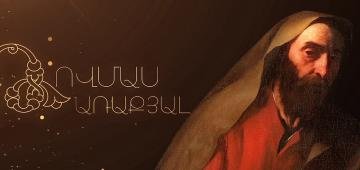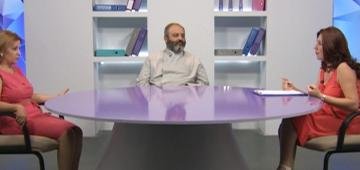 |
The First Epistle to the Thessalonians (4:12-5:8)
For Christians, it is important to understand what happens to the souls of the departed. Father Arnak Harutyunyan interprets the verses 4:12-5:8 from the first epistle of Apostle Paul to the Thessalonians.
|
 |
The First Epistle to the Thessalonians (2:10-20)
What does it mean to leave in holiness and love for brother, how to fight against the obstacles of the wicked? Father Arnak Harutyunyan interprets the verses (2:10-20) from the first epistle of Apostle Paul to the Thessalonians.
|
 |
Gluttony
Gluttony is the infinite inclination to food, when one no longer understands and feels that he/she is full. There are a number of contributing factors to this – from national mentality to psychological issues.
Father Arrnak Harutyunyan and Inga Harutyunyan provide explanations.
|
 |
Laziness
Every single man is endowed by God with the ability to act and create. Falling into the sin of laziness has nothing to do with the economic, social state. The will to create is internal mood.
Father Arrnak Harutyunyan and Inga Harutyunyan provide explanations.
|
 |
Acts: Apostle James
Apostle James and his brother John were the sons of Zebedee. In the bibliography, Apostle James was also called James the Elder or Elder Apostle to differ from James, the son of Alpheus and the brother of Jesus – James. He was mainly preaching in Rome, Spain and Jerusalem.
|
 |
Acts: Apostle Thomas
Despite that there are scarce references on Thomas, a few episodes from the Gospel reveal a rather inquisitive, upright personality, though with a reputation of somewhat doubting person.
|
 |
Russian Armenian Diocese is 300 Years Old
In 2017 the Armenian Diocese of Russia and Nor Nakhichevan will mark the three hundred anniversary of its establishment. In early 18th century, when Armenia was cherishing the hope of getting rid of Turkish and Persian yoke, a new Diocese took its form in the area of the Russian Empire. What activities did the Armenian Diocese evolved in that area and what mission does it carry today among nearly 2 million Russian Armenians? The topic is discussed by the Director of Vatche and Tamar Manoukian Library of the Mother See Father Ararat Poghosyan and historian, Doctor of Russian Historical Sciences Stepan Stepanyants.
|
 |
Post-Golden Apricot
Golden Apricot Film Festival is often accompanied with fervent discussions on films. Even after the closing of the festival are characterised by inertial fluctuations after which everyone leaves the “cross-roads of cultures and civilizations” back to their normal life. The panorama of this year’s Golden Apricot is discussed by Davit Matevosyan, the Director of “Hrant Matevosyan” Foundation and journalist Nune Hakhverdyan.
|
 |
Violence
One of the measures to prevent violence is the reform of social-cultural norms, transfer of necessary communication skills through education, and from theological viewpoint - full perception and acceptance of the identity created in the image of God. How can we build a society which will decline violence? The pavilion of “Option” hosts Director of Social Concepts Office in the Mother See Bishop Bagrat Galstanyan and psychologist of the NGO “Dialogue” Armine Vahanyan.
|
 |
Vacant Higher Education Institutions
The results of 2017-18 academic year saw 11 375 vacancies out of 18 000 places. The specialists of the sphere declare that there is nothing extraordinary. The forecast of the next year is even worse: there will be less applicants, and the share of GDP to be allocated to the sphere of education will be reduced by the 2018-2020 midterm expenditures program of the Government. What do the experts have to offer?
|
|
|
“Protected by the State”
The infringements within the territory of historical cultural monuments is not something rare. The scandalous arguments and litigations over it are never a guarantee for preservation of monuments: often the offenders are the local self-government bodies which are the subjects of protection. How is it ever possible to implement effective protection of historical cultural monuments in Armenia and exclude frauds? The topic is discussed by the Director of the Service for protection of historical environment and cultural museum-reservations” SNCO Ara Tarverdyan andthe Director of the Institute of Archaeology and Ethnography of National Academy Pavel Avetisyan.
|
 |
Euthanasia: Between the Philosophy of Life and Death
Legal evaluation of euthanasia is closely linked to the specifics of medical, moral ethical, philosophical and religious views. In certain countries it is criminal offense, while it is legally allowed in other countries. Euthanasia is legally prohibited in Armenia. What ethical issues does it cause globally, and does the Christian standing help overcome these issues? The topic is discussed by the Head of the Armenian Unit of UNESCO Chair in Bioethics and Very Rev. Father Zakara Baghumian from the Mother See.
|
